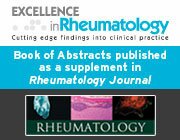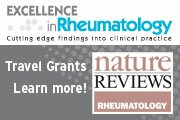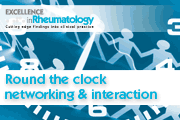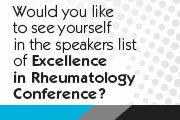Welcome Address
Introduction from the Patient Programme Committee
Listed alphabetically:
- Ailsa Bosworth, Chief Executive, National Rheumatoid Arthritis Society, UK
- Marja Kruithof, Chair of the NVLE, Dutch Patients Organization for Lupus, APS, Scleroderma and MCTD and Secretary of LUPUS EUROPE
- Yvonne Norton, Founder and Chair of West Midlands Lupus Group, Vice Chair of LUPUS UK and Chair of LUPUS EUROPE
- Peter Norton, Treasurer of West Midlands Lupus Group and Treasurer of LUPUS EUROPE
- Maarten de Wit, Responsible for Scientific Research and International Contacts within the Dutch Arthritis Patient League, The Netherlands
It was an exciting moment for all of us to be consulted about the possibility of including a Patient Programme in the 2012 Excellence in Rheumatology Conference to be held in Madrid next January, and to be invited by the organizing scientific committee to form a ‘Patient Committee’ to put together such a programme.
The idea behind EiR, to uniquely focus on the clinical and to present and discuss cutting edge scientific findings as they relate to clinical practice, is a refreshing one. The aim is to provide rheumatologists and related healthcare professionals with developing scientific knowledge that can be applied in everyday clinical practice to improve the care and treatment of patients with rheumatologic diseases. With limited attendance, enabling an intimate environment, we anticipate that opportunities for patients and health professionals to exchange views and network will be optimised.
The first EiR Conference took place in February 2011 in Istanbul and was a resounding success. The first conference did not include a Patient Programme – so this is a new departure and one which we very much welcome. We have decided to focus on two distinct disease areas: Rheumatoid Arthritis and Lupus. As the programme will take place over 2 half days on 25th and 26th January, on day one, we shall focus on keynote plenary session subjects which are common to both diseases, including Doctor/Patient communications and provide opportunity to dig deeper into this issue working in groups, to debate how we might improve our ability to communicate with our health team about key symptoms common to both RA and Lupus - pain and fatigue.
On the second day we shall break into two separate groups and focus on issues specific to each of these disease areas. In RA this will include keynote presentations on the latest developments in the management of the disease and examining patients’ expectations of rheumatology services by discussing how guidelines might help patients to solve unmet needs. These keynote sessions will be followed by an interactive exchange about personal experiences and ideas about cardiovascular risk management including the importance of patient responsibility around the need for self-management and regular monitoring.
For Lupus, day one keynote sessions will discuss new developments in the treatment of SLE including the use and availability of biologics in different countries and products in the pipeline. This will be followed by guidance and guidelines for the newly-diagnosed. Later sessions will include an exchange of experiences and ideas on the pathway from newly-diagnosed to getting established on treatment.
For more details about the Patient Programme and to see the excellent speakers and facilitators who have kindly agreed to contribute to our programme, click here.
It is with enormous gratitude to the organisers and sponsors that we acknowledge the granting of 50 patient burseries to attend this conference. This is a truly unique opportunity enabling 25 people with RA and 25 with Lupus from many different European countries, to attend and contribute to this Patient Programme at no cost to the individual, other than their time and commitment to fully participate and to disseminate what they have learnt to a wider patient audience in their home country after the event. For further information about the burseries, click here.
We are all excited about the opportunities to further patient education and empowerment this conference will present and there will be some additional innovative practices being introduced for the first time, to encourage health professionals and people with rheumatologic conditions to interact including:
- Expert patients manning stations that health professionals can visit during breaks
- ‘Hot Spots’ where patients can discuss issues with health professionals
- Patient delegates will have open access to scientific sessions
There will be ample opportunity for the patient delegates to network with each other and with health professionals and we look forward to a very successful event.
The Patient Programme Committee













